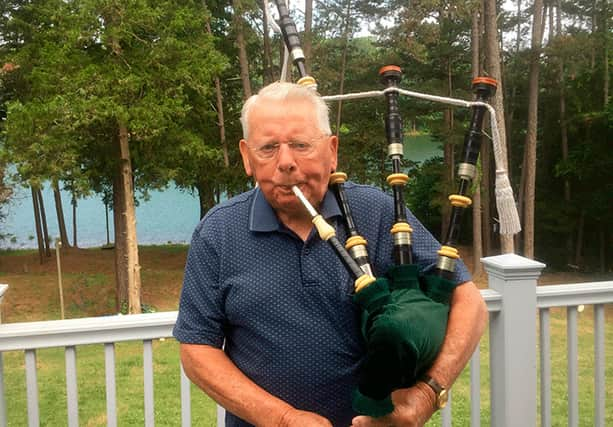Obituary: Jimmy McIntosh, Scottish piper who made new life in US


Jimmy McIntosh’s domineering dad changed the course of his life with several shocks to his system over which the schoolboy apparently had little power.
The first came at the age of 11 when his father announced that the youngster, who had never shown one iota of interest in the instrument, was to learn to play the pipes. A pipe major promptly turned up at the house with a chanter and lessons began.
Advertisement
Hide AdAdvertisement
Hide AdThe second was three years later when he enrolled his 14-year-old son in the Cameron Highlanders. The boy had planned to stay on at school until 15 and train as a draughtsman but two weeks after the outbreak of the Second World War his father enlisted him in the army for 12 years.
Young McIntosh, just 4ft 10in, was utterly speechless. He had never left the Dundee area but the following day was heading to Cameron Barracks, Inverness. Fast forward several decades and, after buying himself out of the army, he had become one of the 20th century’s most influential bagpipers, a piobaireachd master, teacher and architect of the world’s first bachelor’s degree in piping, taking his distinctive style of tutelage all over the world, most notably to North America where he settled permanently.
Born in Broughty Ferry to night watchman JosephMcIntosh and his wife Alexina, he was named after his legendary grandfather – sharing his nickname, Toshie – who was the sole survivor of the 1884 Chieftain whaling tragedy. His forebear, a harpoonist, was lost with four others in a small boat in the Arctic icepack while chasing a whale. The only one found alive 17 days later, he lost both legs to frostbite. Growing up with four siblings in a strict household, his grandson took up the pipes as instructed and in 1938 received a set from the Clan Chief Mackintosh of Mackintosh which he would continue to play into his nineties.
On enlistment in the army he began in the Boys’ Service and progressed quickly in piping, playing in the band. Too young for active service, he transferred to Fort George in 1941 and, aged 17, was sent on a piping course at Edinburgh Castle.
Once old enough he served in Germany and Malaysia where, in 1947, he was a pipe major. Two years later he was able to buy himself out of the army for £100 and returned to Dundee as a bookbinder’s assistant. He played with the city’s MacKenzie Pipe Band before becoming pipe major of the City of Dundee Pipe Band. An apprenticeship at National Cash Register led to a job as a tool setter and in 1957 he established a very successful NCR pipe band. By that time he was married to his first wife Isobel and had a son and twin daughters.
After being made redundant in the early 1970s he taught piping in local schools and experimented with reed making for the pipes, creating a successful business and developing the Naill pipe chanter.
He had by now left pipe bands and returned to solo piping, winning many top level Scottish piping competitions. He had also studied under the Queen’s official pipers, the “Bobs of Balmoral”, R U Brown and R B Nicol.
His love of piobaireachd became an intense passion that he shared with pupils internationally. In 1976 he founded the Competing Pipers’ Association to represent solo pipers, although he retired from competing himself a couple of years later and concentrated on teaching. He taught extensively in the US, Canada, Brittany, Australia and New Zealand, training many prize-winning piping champions and co-founding the Balmoral School of Piping in Pittsburgh. Divorced in 1982, he emigrated to Maryland in the US and moved his business, McIntosh Bagpipe Supplies, to Pittsburgh.
Advertisement
Hide AdAdvertisement
Hide AdTwo years later he married Joyce MacFarlane, and in 1985 was hired by Pittsburgh’s Carnegie Mellon University (CMU) to revive its pipe band.
He went on to release the first video to teach beginners Piobaireachd using the oral method he learned from his Balmoral tutors and joined CMU’s Faculty of Music to head the teaching of an undergraduate degree programme with bagpipe as the principal instrument – a world first. He also served as president of the Eastern United States Pipe Band Association for two terms and developed a comprehensive exam programme for piping adjudicators.
His services to music were recognised when he was made an MBE in 1994 and on retirement from teaching at Carnegie Mellon in 1997 he began working on his book, Ceol Mor for the Great Highland Bagpipe. Awarded the Balvenie Medal for services to piping, presented at Blair Athol Castle in 2002, six years later he was recalled to teach at CMU, retiring for a second time in 2010.
He and Joyce moved to South Carolina, where he still taught a handful of students and went back to writing his book, which he finally published in 2014, aged 89. He mastered Zoom at 95 and was always looking for a new project, his enthusiasm undimmed by age.
A loyal Scotsman and SNP supporter, he read The Scotsman online each day and once said he would like to be remembered as “a good teacher, and as a credit to my own teachers and to Scotland”.
He is survived by his wife Joyce and son Cameron in America, his children Roderick, Moira and Margaret, plus brother Alexander in Scotland and sister Anne in Australia.